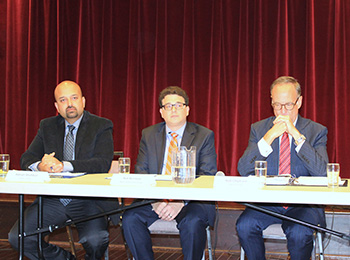At a public election debate on Canada’s response to the Syrian humanitarian crisis, and refugee policy in general, representatives from the Liberals, NDP and Greens answered questions about their parties’ positions on federal health policy for refugees and the Conservatives’ controversial “designated countries of origin” rule.
The Oct. 8 event, organized by Darchei Noam Congregation and the Jewish–Refugee Action Network (JRAN), was moderated by CJN editor Yoni Goldstein.
The parties were represented by Oakville North-Burlington Green candidate Adnan Shahbaz, York Centre NDP candidate Hal Berman, and Don Valley West Liberal candidate Rob Oliphant.
The Conservative party was invited to participate, but did not send a representative.
The candidates fielded questions from the audience, as well as a panel that included Darchei Noam spiritual leader Rabbi Tina Grimberg, JRAN founding member Philip Berger, and JRAN member Ron Shacter.
Oliphant began by explaining that there are people who are Canadians by chance, having been born here, others who are Canadians by choice – immigrants who have chosen to build a life here – and others who are “Canadians by compassion. Those are the refugees… people who have had to flee their homes as a result of war, as a result of famine, civil war, or international war and have looked for a better place of safety.”
Oliphant said the “federal government has to understand that… it has a responsibility to those who are seeking asylum in Canada to ensure fair process, fair health care.”
Shahbaz said he’s realistic about the Green party’s chances of getting elected, but promised that Green MPs would use whatever influence they have to “hold [the government’s] feet to the fire in ensuring that they’ll get things done.”
Shahbaz said the Harper government has spent millions of dollars appealing the Federal Court’s recent ruling against its policy on refugee health care funding. In 2012, the Conservative government cancelled health care for refugee claimants.
Both Shahbaz and Berman said their parties would drop the ongoing appeal if they formed the next government, saying that refugee claimants should be entitled to the same health care as Canadian citizens.
Berman, a palliative care doctor, explained that if a refugee’s health care isn’t covered and they come to a hospital for treatment, the hospital must foot the bill and the cost may have to be recouped from other areas, in the form of cuts to other services or longer wait times.
“We all pay for this in the end. Whether we pay with poor service, or we pay with money, that is the question,” Berman said.
On the issue of abolishing the designated country of origin (DCO) policy, which was put in place to deter people from “safe” countries from applying to Canada as refugees, Berman and Shahbaz said their parties would drop the policy if elected.
“It doesn’t matter where they come from. People who flee a place, if they do so legitimately… they are discriminated against in their country of origin… for religion, sexual orientation, certain practices, whatever. If someone feels that they are in danger, it doesn’t matter where they come from,” Berman said.
Oliphant said “there is something fundamentally wrong about this, fundamentally un-Canadian, and fundamentally contrary to everything we understand about human rights.
“What we have said is refugee determination is based on the individual’s experience and their degree of safety and persecution, no matter where they are from.”
Oliphant added that until three years ago, all claimants, regardless of their country of origin, went through a rigorous process to determine their eligibility, and a Liberal government “will return [to] a sane way of dealing with refugees.”
When an audience member challenged the Liberal record of accepting refugees under former Liberal prime minister Jean Chrétien, pointing out that the numbers accepted into Canada under his leadership were comparable to those under the current Conservative government, Oliphant said, “I stopped playing the numbers game… Do I think the Liberal record is absolutely perfect? Absolutely not. Do I think that if you look at the history of Canada, which governments have done a better job than others around those two issues – immigrants and refugees – I would say it’s the Liberal party.”
Shahbaz said the DCO policy contributes to a two-tier immigration system.
“The idea of the tier system that has been implemented in Canada … is a very dangerous and slippery slope that has started over the past few years. We need to be aware of it, and we need to fight against it,” Shahbaz said.
On the subject of whether Canada is doing enough for Syrian refugees, Oliphant said, “when we saw the image of Alan Kurdi on the beach in Turkey, Canadians were horrified and woke up.
“The reality is, this is four years into the largest humanitarian crisis since World War II… and we are taking baby steps,” he said, adding that the Liberals have committed to bring in 25,000 refugees before the end of this year.
Shahbaz said “this is one of those moments in history right now where we are going to be judged in the future, in how we are handling this huge crisis.”
Berman said an NDP government would not impose a cap on refugees who have family sponsorship and would ensure that all have access to health care.
“Are we making enough of an effort? The answer is no… The best thing we can do to help the refugees in Syria is to elect a different government,” Berman said.
“If there is trouble in the world and we are a safe haven, we need to step up.”
In response to a question from a boy in the audience, Berman said that if the Conservatives win a minority on Oct. 19, Mulcair would work with Trudeau’s Liberals, because “Harper is the worst threat to Canada that we face right now – even greater than ISIS.”
